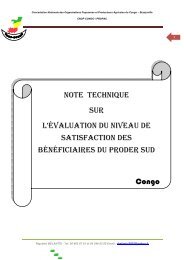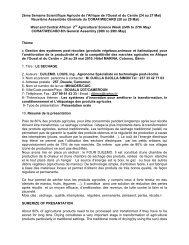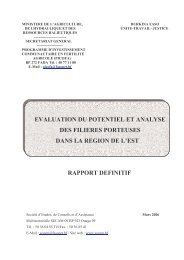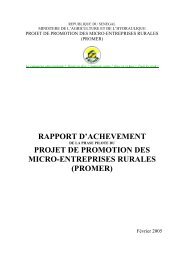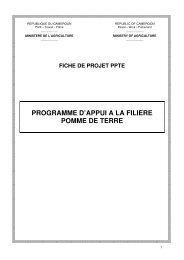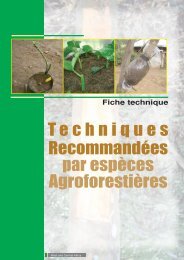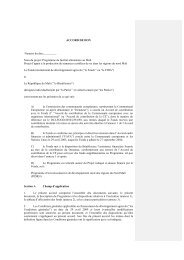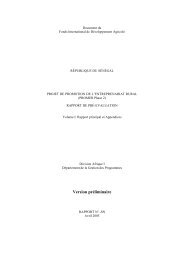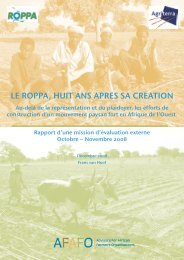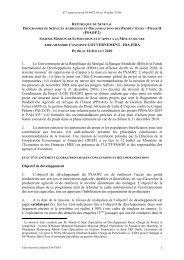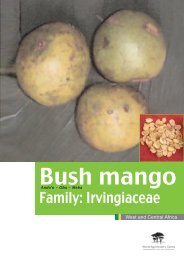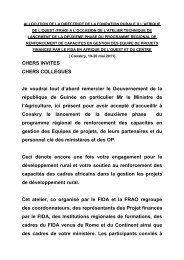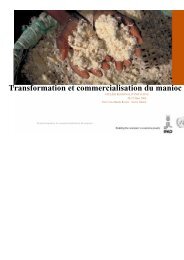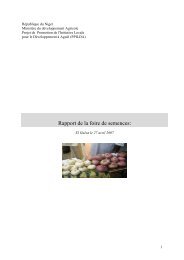Scaling Up the Fight Against Rural Poverty - FIDAfrique
Scaling Up the Fight Against Rural Poverty - FIDAfrique
Scaling Up the Fight Against Rural Poverty - FIDAfrique
You also want an ePaper? Increase the reach of your titles
YUMPU automatically turns print PDFs into web optimized ePapers that Google loves.
of a overarching institutional umbrella for all related rural development efforts (AGRO<br />
RURAL).<br />
• Fiscal space: No major fiscal constraints were encountered in replication and scaling up,<br />
mostly because unit costs were kept low by design – and turned out even lower in<br />
implementation – and because of <strong>the</strong> financing provided by Peru’s international partners, esp.<br />
IFAD, which helped fund <strong>the</strong> start-up costs.<br />
• Cultural space: One of <strong>the</strong> key ingredients of success of <strong>the</strong> Peru program was <strong>the</strong> great<br />
cultural compatibility of <strong>the</strong> rural development model chosen with <strong>the</strong> cultural norms of <strong>the</strong><br />
highland population. The community based approach was particularly well suited to <strong>the</strong><br />
cultural traditions of <strong>the</strong> Andean population in <strong>the</strong> south, less so in <strong>the</strong> north, where <strong>the</strong>re are<br />
fewer Andean communities. As a result <strong>the</strong> SIERRA NORTE project adapted <strong>the</strong> operational<br />
model to rely more on municipal and private sector agents (including <strong>the</strong> mining sector), ra<strong>the</strong>r<br />
than insisting on <strong>the</strong> model of community driven development that was so appropriate in <strong>the</strong><br />
south.<br />
• Learning space: The implementation and supervision arrangements set up by IFAD and <strong>the</strong><br />
PIU created a learning space by enhancing a “learning by doing” culture, flexibility and<br />
openness to change. The learning space was built up by (i) streng<strong>the</strong>ning capacity for mutual<br />
learning, (ii) providing earmarked resources and opportunities for local actors to experiment,<br />
implement and validate technical solutions, (iii) cooperating with a “learning network” of<br />
engaged experts, and (iv) preparing and disseminating documentation (mostly in Spanish) of<br />
experience gained learning processes and products.<br />
e) <strong>Scaling</strong> up – IFAD’s role and processes:<br />
IFAD’s role in supporting <strong>the</strong> scaling up of rural poverty programs in Peru has been significant. It<br />
supported <strong>the</strong> design of projects that incorporate a flexible approach, introducing effective mechanisms<br />
to ensure <strong>the</strong> users’ participation in decision-making on objectives, activities and managing resource<br />
administration. The main elements of this flexibility were (i) a demand-driven approach; (ii)<br />
recognition of <strong>the</strong> central role of communities and families; and (iii) a strategy of developing local<br />
goods and service markets. Three elements fur<strong>the</strong>r contributed to IFAD’s effectiveness in supporting<br />
<strong>the</strong> scaling up process: its willingness to stick with a broadly consistent approach over many years,<br />
building on past experience, and a readiness to adapt in light of lessons learned, changing needs and<br />
specific conditions on <strong>the</strong> ground.<br />
A key driver of IFAD’s engagement in <strong>the</strong> scaling up pathway was <strong>the</strong> fact that <strong>the</strong> long-term CPM<br />
championed this approach and that he was based in Peru for fifteen years. While initially apparently<br />
without much support from IFAD headquarters, <strong>the</strong> CPM received positive feedback at least since<br />
2004, when a study of scaling up in Peru for <strong>the</strong> 2004 Shanghai Conference gave a credit to <strong>the</strong><br />
approach followed in Peru (Massler, 2004). This was reinforced by <strong>the</strong> report of an independent<br />
external evaluation of IFAD in 2005, which also noted <strong>the</strong> positive scaling up experience in Peru<br />
(IFAD Office of Evaluation, 2005). More generally, <strong>the</strong> CPM reports that he valued <strong>the</strong> informal<br />
discussions with supportive colleagues in IFAD.<br />
2. Moldova Case Study 11<br />
Moldova is a small country with 3.3 million people, just beyond <strong>the</strong> borders of <strong>the</strong> EU with no early<br />
accession prospects. The poorest country of Europe, it is still heavily dependent on agriculture and<br />
more than 65 percent of <strong>the</strong> population resides in rural areas. Moldova, as a former republic of <strong>the</strong><br />
Soviet Union, was hard hit by <strong>the</strong> breakup of <strong>the</strong> Soviet economic space. Even after some recovery in<br />
11 Arntraud Hartmann carried out <strong>the</strong> Moldova case study.<br />
18



